|
|
|
Sort Order |
|
|
|
Items / Page
|
|
|
|
|
|
|
| Srl | Item |
| 1 |
ID:
080833


|
|
|
|
|
| Publication |
2008.
|
| Summary/Abstract |
Looking beyond the democratic/Kantian peace argument that highlights the pacifying effect of regime type on international conflict, this study explores additional, potentially important domestic factors that may influence conflict - most notably, civil-military structure, such as degree of civil versus military control and military manpower system. It also looks into the effects of political communication in terms of diplomatic channels and open media. On the basis of logistic regression analysis for 120 countries during the period from 1950 to 1992, the authors report that strong military influence is more likely to lead to the onset of militarized interstate disputes, wars, and international crises while the presence of conscripted soldiers, diplomatic activities, and open media makes that less likely. These results hold up in the presence of the three Kantian peace variables (i.e. democracy, economic interdependence, and joint membership in international organizations) and other control variables that are standards within contemporary research designs. Thus, the authors conclude that the four factors are important complements to understanding the impact of domestic traits on interstate conflict beyond the conventional regime-type explanation of the democratic/Kantian peace
|
|
|
|
|
|
|
|
|
|
|
|
|
|
|
|
| 2 |
ID:
186008


|
|
|
|
|
| Summary/Abstract |
Although South Korea has elected every president under the same democratic constitution since 1987, it has an ongoing puzzle: why do some presidents personalize their regimes (or at least made an effort to do so) while others remain democratic? To explain this puzzle, this study introduces a novel concept, a "lemon presidency." This is where a democratically elected president engenders a personalized regime that is backed by prejudiced judicial authorities such as courts and prosecutors' offices. South Korea experienced two lemon presidencies under Lee Myung-bak and Park Geun-hye. South Koreans viewed Lee and Park as true representatives of democracy during the 2007 and 2012 presidential elections; however, they turned out to possess an unrealistic sense of superiority and became semi-democratic rulers. They personalized political powers by exploiting their appointment and removal powers. Based on case studies and survey results, this study provides evidence for Lee's and Park's lemon presidencies. The overall analysis of this study envisions another lemon presidency in South Korea's future if voters choose to vote for a grandiose leader.
|
|
|
|
|
|
|
|
|
|
|
|
|
|
|
|
| 3 |
ID:
119059


|
|
|
|
|
| Publication |
2013.
|
| Summary/Abstract |
In an attempt to explain the democratic peace phenomenon, existing studies postulate institutional and normative models but treat them as contending and mutually exclusive explanations. This approach is both theoretically and empirically flawed. Extant institutional models fail to acknowledge that institutional factors have an impact only in the presence of requisite normative factors. Similarly, normative models fail to acknowledge that normative factors have the hypothesized impact only in combination with institutional factors. Since the possibility of such an interaction effect is overlooked, existing empirical models of the democratic peace are misspecified. This study fills the gap by introducing a multiplicative interaction model. This study presents evidence that, ceteris paribus, for democratic dyads in which the interaction effect of institutional and normative constraints is high, the likelihood of interstate disputes is lower than for nondemocratic dyads. Consequently, the democratic peace phenomenon should be seen primarily as an outcome of institutional and normative constraints working together.
|
|
|
|
|
|
|
|
|
|
|
|
|
|
|
|
| 4 |
ID:
113936


|
|
|
|
|
| Publication |
2012.
|
| Summary/Abstract |
Although several existing studies examine the economic impact of transnational terrorism by referring to its potential to reduce foreign direct investment (FDI), they overlook possible differences in the effects of business-related and non-business-related terrorism. We argue that the former type of terror negatively affects FDI since it damages multinationals' buildings, destroys their products, kills their employees, and causes a rise in insurance premiums. The latter type of terror, however, does not induce the same ramifications and should thus have little or less influence on a country's FDI. In order to examine the effects of these two different types of transnational terrorism, we employ three different statistical techniques using data gleaned from the International Terrorism: Attributes of Terrorist Events (ITERATE) dataset. A cross-sectional, time-series data analysis of 123 developing countries during the period from 1980 to 2008 reveals that transnational terrorism that harms multinational businesses contributes to a decrease of foreign investment but transnational terrorism that afflicts non-business-related targets is statistically irrelevant. This implies that when countries implement counterterrorism measures that are directly intended to mitigate the impact of business-related terrorist activities, they are likely to attract more foreign capital and should therefore realize a greater degree of economic development.
|
|
|
|
|
|
|
|
|
|
|
|
|
|
|
|
| 5 |
ID:
168798
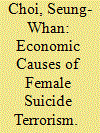

|
|
|
|
|
| Summary/Abstract |
Common belief holds that economic misery motivates more people to commit acts of suicide terrorism. The existing literature, however, fails to find an empirical linkage between these two phenomena. This study offers a novel theoretical perspective and statistical evidence on the economy and terrorism connection. I argue that Muslim women decide to engage in acts of suicide terrorism because of their perception of the national economy, rather than actual economic conditions such as gross domestic product per capita or the Gini index. Based upon a statistical analysis of 4,495 incidents of suicide terrorism during the period from 1981 to 2015, the study shows that, when Muslim women perceive their national economy to be unfavorable, they are more likely to commit acts of suicide terrorism.
|
|
|
|
|
|
|
|
|
|
|
|
|
|
|
|
| 6 |
ID:
143599
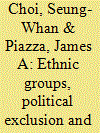

|
|
|
|
|
| Summary/Abstract |
This study examines whether the exclusion of ethnic groups from political power is an important contributing factor to domestic terrorism. To empirically test this question, we employ a negative binomial regression estimation on 130 countries during the period from 1981 to 2005. We find that countries in which certain ethnic populations are excluded from political power are significantly more likely to experience domestic terrorist attacks and to suffer from terrorist casualties; furthermore, ethnic group political exclusion is a more consistent and substantive predictor of domestic terrorist activity than general political repression or economic discrimination.
|
|
|
|
|
|
|
|
|
|
|
|
|
|
|
|
| 7 |
ID:
101685
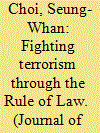

|
|
|
|
|
| Publication |
2010.
|
| Summary/Abstract |
The question of whether democratic institutions facilitate terrorist activities is a controversial one in current scientific studies of terrorism. Although the ''rule of law'' is an essential institutional pillar of any mature democracy, its direct effect on domestic and international terrorism remains unexplored. Conceiving democratic rule of law as the coexistence of effective and impartial judicial systems and citizens' recognition of the law as legitimate, the author presents a causal explanation in which a high-quality rule of law is considered to dampen ordinary citizens' opportunity and willingness to engage in political violence, protecting democracies from becoming victims of terrorism. Built on a cross-sectional, time-series data analysis of 131 countries during the period from 1984 to 2004, the author finds that, ceteris paribus, maintaining a sound rule of law notably reduces the likelihood of any type of terrorist events. In short, the rule of law instantiated in democratic institutions provides a formidable bulwark against terrorism.
|
|
|
|
|
|
|
|
|
|
|
|
|
|
|
|
| 8 |
ID:
151150
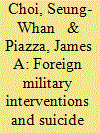

|
|
|
|
|
| Summary/Abstract |
This study examines the effect of foreign military interventions on the incidence of suicide attacks. It presents three theoretical explanations. Foreign military interventions may boost insurgent use of suicide attacks by (a) fomenting a nationalist backlash that sanctions the use of more extreme and unconventional tactics like suicide attacks, (b) providing more and better targets against which suicide attacks can be launched, or (c) prompting insurgents to use suicide tactics in order to overcome their power asymmetries and to confront better defended targets that are enhanced by interventions. We test these competing explanations using a battery of statistical tests on cross-national, time-series data for 138 countries during the period from 1981 to 2005. We find that only foreign interventions with specific features—pro-government interventions involving larger numbers of ground troops—boost suicide attacks in countries experiencing interventions. This finding suggests that by tipping the balance of power against insurgents and hardening targets in the context of assisting a local government, foreign military interventions are likely to increase the use of suicide attacks by regime challengers.
|
|
|
|
|
|
|
|
|
|
|
|
|
|
|
|
| 9 |
ID:
178018


|
|
|
|
|
| Summary/Abstract |
Though populist politicians deem the terrorist threat as a reason for restrictive immigration policies, existing studies neglect to explore the systematic connection between immigration and security. This study offers a novel theoretical argument about the effect of terrorism on immigration policy and then conducts a first-cut empirical analysis. Based on a battery of statistical tests performed against pooled panel data on immigrant-receiving countries that are attractive to low-skilled workers due to high wages, this study shows evidence that terrorist threats are actually unrelated to restrictive immigration policies.
|
|
|
|
|
|
|
|
|
|
|
|
|
|
|
|
| 10 |
ID:
147695
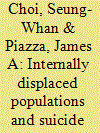

|
|
|
|
|
| Summary/Abstract |
This study asserts that countries with large internally displaced populations (IDPs) are more likely to experience a higher rate of suicide terrorism. After demonstrating this, the study tests four intervening factors hypothesized to drive the relationship between IDPs and suicide attacks: IDPs are expected (1) to increase the pool of potential suicide recruits, thereby lowering the labor costs for suicide terrorist groups; (2) to increase local ethnic conflicts that foster a favorable environment for suicide terrorism; (3) to worsen the human rights conditions in countries, prompting aggrieved people to support suicide terrorist tactics; and (4) to raise the counterterrorism and policing costs of the state, enabling terrorists to plan and execute suicide attacks. Results from negative binomial regression and Tobit models show evidence for the IDPs-suicide terrorism connection. When recursive models are employed to evaluate the effects of four intervening variables, the results most consistently support human rights violations as a significant and substantive mediator between IDPs and suicide attacks.
|
|
|
|
|
|
|
|
|
|
|
|
|
|
|
|
| 11 |
ID:
161438
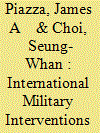

|
|
|
|
|
| Summary/Abstract |
Are states that engage in foreign military interventions vulnerable to subsequent transnational terrorist attacks? If so, do all types of foreign interventions stimulate terrorism? Using data on international military interventions for 125 to 182 countries during the period from 1970 to 2005, we demonstrate that states experience more terrorism after they engage in military interventions. In particular, politico-strategic use of military force abroad—for example, interference in another country's domestic disputes, territorial interventions, or interventions to affect local politics and policy—leads to increased subsequent transnational terrorist attacks for the intervener. In contrast, socioeconomic foreign military interventions, such as those geared toward providing humanitarian relief, protecting social groups, or securing economic interests, do not lead to an increase in transnational terrorist attacks against intervening states.
|
|
|
|
|
|
|
|
|
|
|
|
|
|
|
|
| 12 |
ID:
096560


|
|
|
|
|
| Publication |
2010.
|
| Summary/Abstract |
Tsebelis' veto players theory predicts that legislative veto players constrain the executive's political decisions because their approval is needed to implement policy change. This study extends the veto players argument into international conflict literature, specifically in regard to legislative constraints emanating from the number of legislative veto players, their policy preferences, and their internal cohesion. A cross-sectional, time-series dyadic data analysis shows that, in general, an increase of legislative constraints notably reduces the likelihood of the onset of militarized interstate disputes. However, while legislative constraints in democratic and mixed dyads are likely to discourage democratic executives' use of force, those in autocratic dyads do not produce effective pacifying effects.
|
|
|
|
|
|
|
|
|
|
|
|
|
|
|
|
| 13 |
ID:
148043


|
|
|
|
|
| Summary/Abstract |
Do democracies become less peaceful with one another as the overall number of democratic states in the international system increases? Gartzke and Weisiger (2013, 2014) claim that they do. However, I argue that their evidence stems from a mathematical error in their statistical model. Once I correct that error, their findings no longer hold. In other words, when Gartzke and Weisiger's model receives proper specification, no dyadic and systemic difference persists, while democracy emerges as a pacifying factor that reduces the likelihood of interstate dispute.
|
|
|
|
|
|
|
|
|
|
|
|
|
|
|
|
| 14 |
ID:
106931
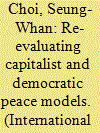

|
|
|
|
|
| Publication |
2011.
|
| Summary/Abstract |
After replicating Oneal and Russett's (International Studies Quarterly, 41, 1997, 267; Journal of Peace Research, 36, 1999, 423) democratic peace model, Gartzke's (American Journal of Political Science, 51, 2007, 180) study contends that "capitalism, and not democracy, leads to peace. Additional research is needed to corroborate, extend, and even refute the findings reported here." In response to this open invitation, this study re-evaluates Gartzke's capitalist peace model along with Oneal and Russett's democratic peace model. This study identifies that while the capitalist peace model suffers from model misspecification, observation omission, and sample selection bias, the democratic peace model commits measurement error. After correcting these four problems, this study uncovers that while capitalism does not emerge as a cause mitigating militarized disputes or wars in a consistent manner, democracy does.
|
|
|
|
|
|
|
|
|
|
|
|
|
|
|
|
| 15 |
ID:
147316


|
|
|
|
|
| Summary/Abstract |
Democracy, human rights, and terrorism are major foreign policy issues. However, among these issues, what do the US leaders care about the most? This study assesses the degree to which Washington responds militarily to threats to democratic institutions, human rights abuses, and terrorist activity in other countries. Based on a cross-national, time-series data analysis of 164 countries for the years 1981 to 2005, this study presents empirical models that evaluate the relative importance of these issues for contemporary American foreign and security policy. It turns out that, all other things being equal, the United States is likely to engage in military campaigns for humanitarian reasons that focus on human rights protection rather than for its own security interests such as democracy promotion or terrorism reduction. This finding is extremely robust and reinforced by case illustrations that support a causal explanation for US intervention with a basic and sustained place for human rights protection.
|
|
|
|
|
|
|
|
|
|
|
|
|
|
|
|
|
|
|
|
|